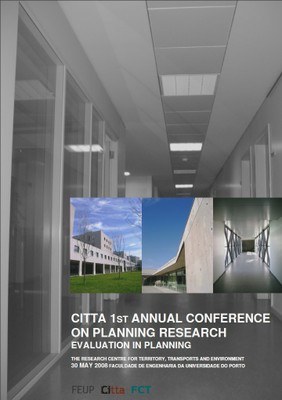CITTA 1st Annual Conference on Planning Research
EVALUATION IN PLANNING
Organizing Committe:
Paulo Pinho, Vítor Oliveira,Sara Cruz, Paulo Conceição, Sandra Melo
Scientific Committe:
Patsey Healey, David Perry, Kenneth Button, Klauz Kunzmann, Paulo Pinho, Isabel Breda-Vázquez, Álvaro Costa
Introduction
The title - Planning Evaluation – reflects the general theme of the conference. As a research topic, the evaluation of planning activities already has a long history and yet, it is still a rather difficult and controversial issue to address. The first contributions date back to the 1960s. At that time, a number of evaluation methodologies appeared in the planning literature as refinements of the classical Cost Benefit Analysis. Their general conceptual framework was very much in accordance with the then dominant Rational Comprehensive Planning model. However, those early days left very few records of practical applications, at least documented in the international planning literature.
With the subsequent evolution of planning theories, from the mid 1980s through to the turn of the century, and the emergence and steady dissemination of the Collaborative Planning paradigm, new and more complex methodologies have been proposed. Again, very few contributions can be traced in the planning literature of systematic applications of these methodologies in local planning departments or in independent planning research units.
Everyone seems to agree that evaluation is an essential component of the planning process and an indispensable instrument to (re)design responsive planning policies. But, actually, very few invest their time and resources in systematic planning evaluation exercises geared towards the preparation and implementation of a particular land use plan or planning policy document, or towards the assessment of the role and overall performance of a particular regional or local planning department. In this context, the role, methods and techniques of planning evaluation will be the focus of this 1st CITTA conference.
Paulo Pinho
